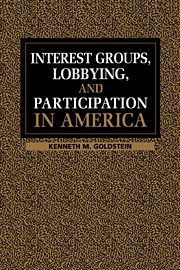Book contents
- Frontmatter
- Contents
- List of Figures and Tables
- Acknowledgments
- 1 Introduction
- 2 Patterns and Puzzles in Participation and Lobbying
- 3 The Political Logic of Political Decisions
- 4 Explaining Lobbying Decisions
- 5 Lobbying Decisions and the Health Care Reform Battle
- 6 Patterns of Recruitment and Participation in the Mass Public
- 7 Conclusion
- Appendix A Sources and Coding for Survey Data
- Appendix B Interest Group Sampling Frame
- Appendix C Chronology of Health Care Reform Legislation
- Bibliography
- Index
4 - Explaining Lobbying Decisions
Published online by Cambridge University Press: 23 September 2009
- Frontmatter
- Contents
- List of Figures and Tables
- Acknowledgments
- 1 Introduction
- 2 Patterns and Puzzles in Participation and Lobbying
- 3 The Political Logic of Political Decisions
- 4 Explaining Lobbying Decisions
- 5 Lobbying Decisions and the Health Care Reform Battle
- 6 Patterns of Recruitment and Participation in the Mass Public
- 7 Conclusion
- Appendix A Sources and Coding for Survey Data
- Appendix B Interest Group Sampling Frame
- Appendix C Chronology of Health Care Reform Legislation
- Bibliography
- Index
Summary
Well, politics.
Union field director's response when asked what
factors influenced the union's targeting decisions
The three most important aspects of grass roots
lobbying are targeting, targeting, and targeting.
Trade association field directorIn the previous chapter I laid out a theoretical framework to explain grass roots lobbying choices. Using information I gathered on grass roots lobbying campaigns, I now begin the task of investigating if the actual methods and lobbying choices of interest groups are consistent with this theoretical framework. The heart of this chapter consists of data gathered from forty-one formal interviews with interest group representatives. As discussed in the Introduction, the unit of analysis in this data set is neither the individual whom I interviewed nor the group he or she represented. Instead, the unit of analysis is the individual grass roots campaigns and lobbying choices that were made.
Altogether, the forty-one interviews covered ninety-four separate grass roots lobbying campaigns across fifteen issue domains. Because of the timing of my study, campaigns connected with health care compose almost one-quarter (22 percent) of all lobbying campaigns in my sample and almost one-third (31 percent) of the lobbying campaigns with a legislative objective. Since I had sufficient cases and extra information on health care lobbying and so as not to overwhelm all the other issue advocacy campaigns, I concentrate on health care lobbying decisions alone in Chapter 5. In this chapter, I focus on the fourteen remaining issues on which I gathered information.
- Type
- Chapter
- Information
- Interest Groups, Lobbying, and Participation in America , pp. 53 - 71Publisher: Cambridge University PressPrint publication year: 1999



